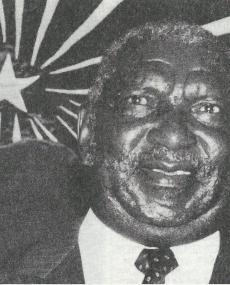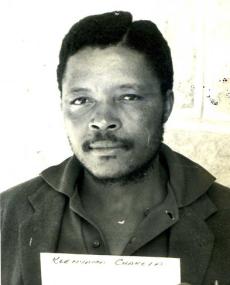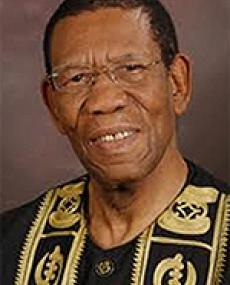The following is by Dr. Motsoko Pheko of the Pan Africanist Congress of Azania and a former member of the South African Parliament:
Road to Pan-Africanism
Motsoko Pheko
Johannesburg (The Sowetan, November 15, 1999)
Following the dark cloud of slavery and colonialism in Africa, visionary African leaders realised that it was imperative that all Africans - wherever they might be - should unite to end their holocaust which began with the 'European Renaissance' in Italy in 1400.
In 1900 Sylvester Williams, a lawyer of African descent, named this coming together of Africans 'Pan-Africanism'. But as a movement, Pan-Africanism began in 1776.
It was, however, the fifth Pan-African Congress held in Manchester, England, in 1945 that advanced Pan-Africanism and applied it to the decolonisation ofthe African continent politically.
Some African leaders involved in this noble cause were giants such as Kwame Nkrumah, William du Bois, Jomo Kenyatta, Robert Sobukwe and Patrice Lumumba.
Pan-Africanism includes the intellectual, political and economic cooperation that should lead to the political unity of Africa. The Pan-African alternative provides a framework for African unity.
It also fosters radical change in the colonial structures of the economy, and the implementation of an inward-looking strategy of production and development. It calls for the unification of financial markets, economic integration, a new strategy for initial capital accumulation and the design of a new political map for Africa.
Contemporary Africa is beset with difficulties rooted in its inability to unite territorially. The consequences have been national economies incapable of developing because of geographical, economic and political reasons.
We must accept this truth, and take it as our prime duty, if the restoration of Africa is to become a reality.
As South Africa prepares for the ratification of the Southern African Development Community (SADC) protocol on trade, we need to look beyond trade integration and analyse regional integration.
The artificial borders that separate the national territories in the region are divisive of people united by history and divisive of regions united by geography to the extent that they are the subject of disputes and conflicts between African states. SADC must strive for a community that transcends the economic level and strive for the territorial and political unification of Africa. This is the only way for the continent to become a great modern power. This is the only protection against neo-liberalism and globalisation.
Africa provided leadership of the world for 600 000 years before its enslavement began about 1400. Monotheism was first taught in Africa by Emperor Akhenaton and his wife Nefertiti, before the so-called three major religions of the world taught this doctrine.
Historical evidence reveals that Africa had its renaissance centuries, if not millenniums, before Europe. Some of Africa's past civilisations were in the Nile, Zimbabwe, Congo and Ghana. It was the trans-Atlantic slave trade and colonialism which destroyed Africa and underdeveloped it. In his book How Europe underdeveloped Africa, Dr Walter Rodney gives a vivid picture of this African tragedy.
Slavery and colonialism were made possible by the so-called European Renaissance. The authors of this renaissance used the compass and gunpowder. These Chinese inventions for peaceful purposes were used by Europeans to steal the land and wealth of Africans.
Pan-Africanism demands that the riches of Africa be used for the benefit, upliftment, development and enjoyment of the African people. Pan-Africanism is a system of equitably sharing food, clothing, homes, education, healthcare, wealth, land, work, security of life and happiness. Pan-Africanism is the privilege of the African people to love themselves and to give themselves and their way of life respect and preference.
Pan-Africanism was developed by outstanding African scholars, political scientists, historians and philosophers living in Africa and the diaspora. It was conceived in the womb of Africa. It is a product made in Africa by Africans.
Pan-Africanism is the oldest vision in Africa. No other ideology has successfully challenged Pan-Africanism intellectually.
That is why, in the midst of confusion caused by the so-called 'African renaissance', Colonel Muammar Gaddafi echoed the pan-African call for a United States of Africa when he opened the fifth summit of the Organisation of African Unity in Libya in September.
In August a prominent Nigerian political scientist reminded participants at the fifth Pan-African Colloquium in Ghana of the historical context of the 'European Renaissance', from which the so-called 'African renaissance' is trying to borrow and transpose its rationale.
He pointed out that the 'European Renaissance' was the foundation of slavery, colonialism and racism. Africa has nothing to gain from this decadence, which was responsible for the worst holocaust of the African people in memory.
The inheritors of this inhuman 'renaissance' are still working hard to perpetuate the holocaust of the African people and the underdevelopment of Africa, which they inflicted through slavery, colonialism, apartheid and racism.
Today these forces have their Pan-Europeanism through their European Union, making them a powerful economic bloc. They are integrating socially and politically, and working for a borderless Europe.
On the other hand, Africa is wallowing in the quagmire of underdevelopment, poverty, endless border wars, economic domination and the dictatorship of the International Monetary Fund and the World Bank.
This is because African leaders are dragging their feet on the implementation of Pan-Africanism and have made Africa a perpetual beggar of foreign 'aid'.
Some of these leaders have become agents of neo-liberalism and neo-colonialism, whose instrument is 'globalisation'. Globalisation is just a new form of recolonising the African continent.
There will continue to be an ideological and intellectual crisis in the African world until Africans understand Pan-Africanism, its value and benefits, and apply it to their many problems.
These include 'foreign debts', reparations, repatriation of African intellectual property from the museums of Europe, lack of continental railroads and air routes, intra-trade, communication and technological development among the African people and states.
The triumph of Pan-Africanism, the only way Africans can survive the foreign onslaught and live as a truly liberated people, will come out of the sweat and blood of the African people themselves.As Nkrumah put it:
'Only a united Africa can redeem its past glory, renew and reinforce its strength for the realisation of its destiny.
'We are today the richest and yet the poorest of continents, but in unity our continent could smile in a new era of prosperity and power.'


